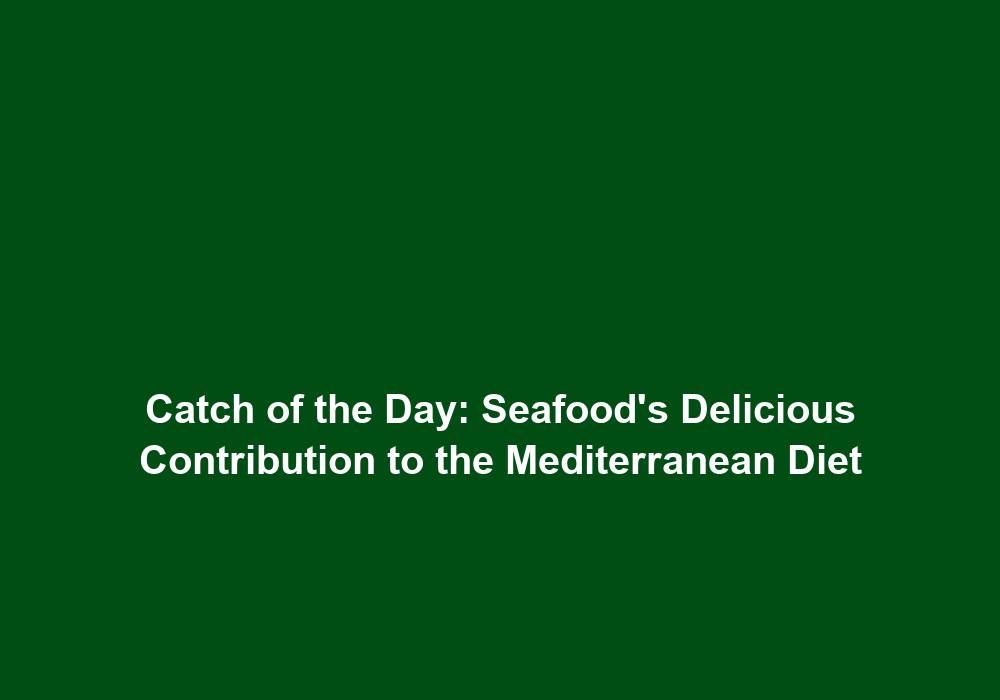Catch of the Day: Seafood’s Delicious Contribution to the Mediterranean Diet
Seafood has always played a significant role in the Mediterranean diet, renowned for its numerous health benefits. This diet, consisting of an abundance of fruits, vegetables, whole grains, and healthy fats, has been associated with a reduced risk of heart disease, lower cholesterol levels, and improved overall well-being. One of the key components of this diet is the consumption of seafood, which not only adds delicious flavors to meals but also provides a wide range of nutrients essential for a balanced and nutritious eating pattern. In this article, we will explore the exceptional contribution of seafood to the Mediterranean diet and shed light on its many advantages.
The Nutritional Powerhouse of Seafood
Seafood is an incredibly nutritious food group that offers a rich source of essential vitamins, minerals, and omega-3 fatty acids. These nutrients are vital for maintaining optimal health and well-being. Let’s take a closer look at the key nutritional components found in seafood:
-
Omega-3 Fatty Acids: Seafood, especially fatty fish like salmon, mackerel, and sardines, is a fantastic source of omega-3 fatty acids. These essential fats have been extensively studied for their numerous health benefits. Omega-3 fatty acids have been shown to reduce inflammation, lower blood pressure, support brain health, and promote heart health. They are also beneficial for maintaining healthy skin and hair.
-
Protein: Seafood is an excellent source of high-quality protein, making it an ideal choice for those looking to increase their protein intake. Protein is essential for building and repairing tissues, supporting muscle growth, and maintaining a healthy immune system. It also helps with satiety, making you feel fuller for longer and aiding in weight management.
-
Vitamins and Minerals: Seafood is rich in a wide array of essential vitamins and minerals. It is particularly high in vitamins D and B12, iodine, selenium, and zinc. These nutrients play crucial roles in bone health, immune function, energy production, and many other important bodily processes. Vitamin D is essential for calcium absorption and bone strength, while vitamin B12 is crucial for the production of red blood cells and the maintenance of a healthy nervous system.
-
Low in Saturated Fat: Compared to other animal protein sources, seafood is generally low in saturated fat. This makes it a heart-healthy choice, as a high intake of saturated fat has been associated with an increased risk of cardiovascular diseases. Choosing seafood as a protein source can help maintain a healthy cholesterol level and reduce the risk of heart attacks and strokes.
Health Benefits of Seafood in the Mediterranean Diet
Incorporating seafood into the Mediterranean diet offers a multitude of health benefits. Let’s delve into how seafood contributes to overall well-being:
1. Cardiovascular Health
The consumption of seafood, particularly fatty fish, has been strongly linked to a reduced risk of cardiovascular diseases. The omega-3 fatty acids found in seafood have been shown to improve heart health by reducing the risk of arrhythmias, improving blood vessel function, and lowering triglyceride levels. Including seafood in the diet can help maintain healthy cholesterol levels and reduce the risk of heart attacks and strokes. It is recommended to consume at least two servings of fatty fish per week to reap these cardiovascular benefits.
2. Brain Health
Seafood’s omega-3 fatty acids are not only beneficial for the heart but also essential for optimal brain health. DHA (docosahexaenoic acid), one of the primary omega-3 fatty acids found in seafood, is crucial for brain development and function. It has been associated with improved cognitive function, reduced risk of age-related cognitive decline, and a lower likelihood of developing neurodegenerative diseases such as Alzheimer’s. Including seafood in your diet can help support brain health and protect against cognitive decline.
3. Weight Management
Seafood can be a valuable addition to a weight management plan. Its high protein content helps promote satiety, reduce appetite, and increase metabolism. Protein takes longer to digest than carbohydrates, keeping you feeling fuller for longer periods of time. Incorporating seafood into a balanced diet can assist in weight loss efforts, as it provides essential nutrients while being relatively low in calories. It is a nutritious option that can help you maintain a healthy weight and manage your appetite.
4. Inflammation Reduction
Chronic inflammation is a contributing factor to many chronic diseases, including heart disease, diabetes, and certain types of cancer. The omega-3 fatty acids found in seafood have potent anti-inflammatory properties, helping to reduce inflammation in the body. They inhibit the production of inflammatory molecules and promote the production of anti-inflammatory molecules. Including seafood in the Mediterranean diet can help combat inflammation and promote overall wellness.
Tips for Incorporating Seafood into Your Mediterranean Diet
Now that we understand the incredible benefits of seafood in the Mediterranean diet, let’s explore some practical tips for incorporating it into your daily meals:
-
Choose Fatty Fish: Opt for fatty fish like salmon, mackerel, trout, and sardines, as they are rich in omega-3 fatty acids. These fish not only offer delicious flavors but also provide significant health benefits. Incorporate them into your meals at least twice a week to meet your omega-3 fatty acid needs.
-
Experiment with Seafood Recipes: Explore a variety of seafood recipes that showcase different flavors and cooking methods. Grilled fish, seafood stews, and seafood salads are just a few examples of the endless possibilities. Don’t be afraid to try new recipes and experiment with different spices and herbs to enhance the taste of your seafood dishes.
-
Include Seafood in Salads: Add cooked shrimp, crab, or tuna to your salads for an extra boost of protein and flavor. Seafood pairs perfectly with fresh vegetables and can turn a simple salad into a satisfying and nutritious meal. It adds a delightful texture and a burst of flavor to your greens.
-
Try Canned Seafood: Canned seafood, such as canned tuna or sardines, is a convenient and affordable option. These pantry staples can be added to pasta dishes, sandwiches, or enjoyed on their own. They are a great source of protein and omega-3 fatty acids, making them an excellent choice for quick and easy meals.
-
Visit Local Seafood Markets: If you have access to a local seafood market, make it a habit to visit regularly. Fresh seafood is not only more flavorful but also offers the highest nutritional value. Supporting local seafood markets also encourages sustainable fishing practices and helps protect our oceans.
-
Be Mindful of Sustainability: When purchasing seafood, choose sustainable options to support responsible fishing practices and protect our oceans. Look for certifications like MSC (Marine Stewardship Council) or ASC (Aquaculture Stewardship Council) to ensure your seafood comes from sustainable sources. By making sustainable seafood choices, you can enjoy the benefits of seafood while preserving marine ecosystems for future generations.
In conclusion, seafood plays a vital role in the Mediterranean diet, contributing to its delicious flavors and numerous health benefits. From its abundance of omega-3 fatty acids to its high-quality protein and various vitamins and minerals, seafood offers a nutritional powerhouse that supports cardiovascular health, brain function, weight management, and inflammation reduction. By incorporating seafood into your Mediterranean diet, you can enjoy a diverse and flavorful culinary experience while reaping the many advantages it provides. Embrace the catch of the day and savor the benefits it brings to your overall well-being!







